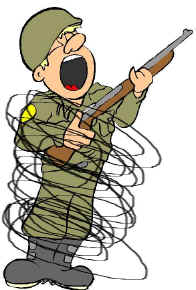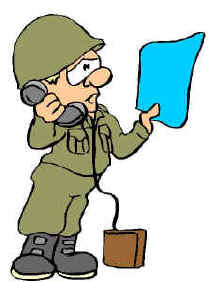Commo Wire
|
Pygar:
An angel does not make love, an angel *is* love.
Barbarella
|
D
Vautier
11/2006
The ground laid tactical
Communication wire or “commo” wire that the army used in 1964 was
some really strong stuff. It
was a twisted pair with an extremely hard plastic cover, snowproof,
waterproof, ratproof, chewproof, fireproof, carproof, martianproof
mangleproof, and
just about everything else proof. Each wire consisted of six or seven fine copper threads, accompanied
by three high tension steel wire fibers. I swear you could not even bend the stuff let alone break it.
The use of wire for tactical support and communication means that
about the
only way the enemy can intercept message traffic is by physically tapping
into a wire—a difficult thing to do.
Our outfit in Germany used tons
of commo wire when we went out on maneuvers. I came to the belief that if they ever had an earthquake in that
area of Germany, nothing would happen because the whole place was held together by
commo wire.
 Our commo platoon had a couple three-quarter ton trucks and several jeeps.
When
the time came to lay wire, they had each of their big trucks with huge
spools rigged in the back spewing out wire
like nobody’s business. It
reminded me of a giant spider at work spinning web. Commo platoon would tie in the FO (forward observer) stations, and
then proceed to the other units, Sound, and Radar. When the terrain
became too difficult they would use some hand-carried spools of wire.
When communication
failed they wouldn’t bother to fix old line; they would just lay a new line.
Our commo platoon had a couple three-quarter ton trucks and several jeeps.
When
the time came to lay wire, they had each of their big trucks with huge
spools rigged in the back spewing out wire
like nobody’s business. It
reminded me of a giant spider at work spinning web. Commo platoon would tie in the FO (forward observer) stations, and
then proceed to the other units, Sound, and Radar. When the terrain
became too difficult they would use some hand-carried spools of wire.
When communication
failed they wouldn’t bother to fix old line; they would just lay a new line.
Our survey platoon did not use hard lines when we
did our work, because we moved to
fast. Instead we used the PRC-9 radio unit, more affectionately known as
the “prick-nine”, the same unit they were then using in Vietnam at
that time. Our communication was
not considered tactical or secured, and certainly not family-oriented, but we did
have to observe some standard radio procedure, which excluded about 90 percent
of our standard vocabulary.
Here is a usual exchange.
 Chief: “Break, break,
five-three-charlie. This is five-three-delta. Are you aware that you have just lost your rear range pole?
Over”
Chief: “Break, break,
five-three-charlie. This is five-three-delta. Are you aware that you have just lost your rear range pole?
Over”
Me: “Ahhhh, Errrr-rr roger,
five-three-delta, I read you loud and clear. I have been advised three quarter ton truck just ran by rear station trailing about a mile of commo wire.
It appears that commo wire took out our rear station and it is now
rapidly traveling down the road at a high rate of speed. Please advise.
Over”
Chief: “Er, roger, five-three-charlie,
understand that you need to reestablish rear station. Understand also that range pole and sleeper have been carried off
by some stray commo wire. Over’
Me: “This is five-three-charlie,
that is affirmative, will stand by,
out”
 When you used the airwaves you
didn’t leave anything behind, but commo wire did get left behind and it was everywhere, and it had
a half-life of about 10 thousand years. Often we came back from an exercise with all sorts of commo wire
wrapped around our axles. I
used to get under my truck and start cutting.
It was a big job especially when the wire got into the seals. I
hated commo wire.
When you used the airwaves you
didn’t leave anything behind, but commo wire did get left behind and it was everywhere, and it had
a half-life of about 10 thousand years. Often we came back from an exercise with all sorts of commo wire
wrapped around our axles. I
used to get under my truck and start cutting.
It was a big job especially when the wire got into the seals. I
hated commo wire.
On one field exercise,
we had set up a position across the road from battery headquarters. So here comes a commo guy with his wire spool.
He cuts the wire and adeptly attaches it into a phone next to our
platoon sergeant’s bivouac tent. I said “Did you know that you laid that wire right across the road?”
The commo
guy shrugs and replies “ah, mox nix” (German for “das ist macht
nicht” which means “no biggie”). It wasn’t two minutes later that the platoon sergeant’s orderly
was receiving a tactical message on the phone, this tall rather handsome guy, as I remember.
All
of the sudden a deuce-and-a-half (2 1/2 ton truck) came ripping down the
road. The commo wire gets
caught in its axle and the phone went flying out of the guys hands so he
starts running down the road in hot pursuit of his phone.
I didn't get over that one for a long time.
 Our commo platoon had a couple three-quarter ton trucks and several jeeps.
When
the time came to lay wire, they had each of their big trucks with huge
spools rigged in the back spewing out wire
like nobody’s business. It
reminded me of a giant spider at work spinning web. Commo platoon would tie in the FO (forward observer) stations, and
then proceed to the other units, Sound, and Radar. When the terrain
became too difficult they would use some hand-carried spools of wire.
When communication
failed they wouldn’t bother to fix old line; they would just lay a new line.
Our commo platoon had a couple three-quarter ton trucks and several jeeps.
When
the time came to lay wire, they had each of their big trucks with huge
spools rigged in the back spewing out wire
like nobody’s business. It
reminded me of a giant spider at work spinning web. Commo platoon would tie in the FO (forward observer) stations, and
then proceed to the other units, Sound, and Radar. When the terrain
became too difficult they would use some hand-carried spools of wire.
When communication
failed they wouldn’t bother to fix old line; they would just lay a new line. Chief: “Break, break,
five-three-charlie. This is five-three-delta. Are you aware that you have just lost your rear range pole?
Over”
Chief: “Break, break,
five-three-charlie. This is five-three-delta. Are you aware that you have just lost your rear range pole?
Over” When you used the airwaves you
didn’t leave anything behind, but commo wire did get left behind and it was everywhere, and it had
a half-life of about 10 thousand years. Often we came back from an exercise with all sorts of commo wire
wrapped around our axles. I
used to get under my truck and start cutting.
It was a big job especially when the wire got into the seals. I
hated commo wire.
When you used the airwaves you
didn’t leave anything behind, but commo wire did get left behind and it was everywhere, and it had
a half-life of about 10 thousand years. Often we came back from an exercise with all sorts of commo wire
wrapped around our axles. I
used to get under my truck and start cutting.
It was a big job especially when the wire got into the seals. I
hated commo wire.